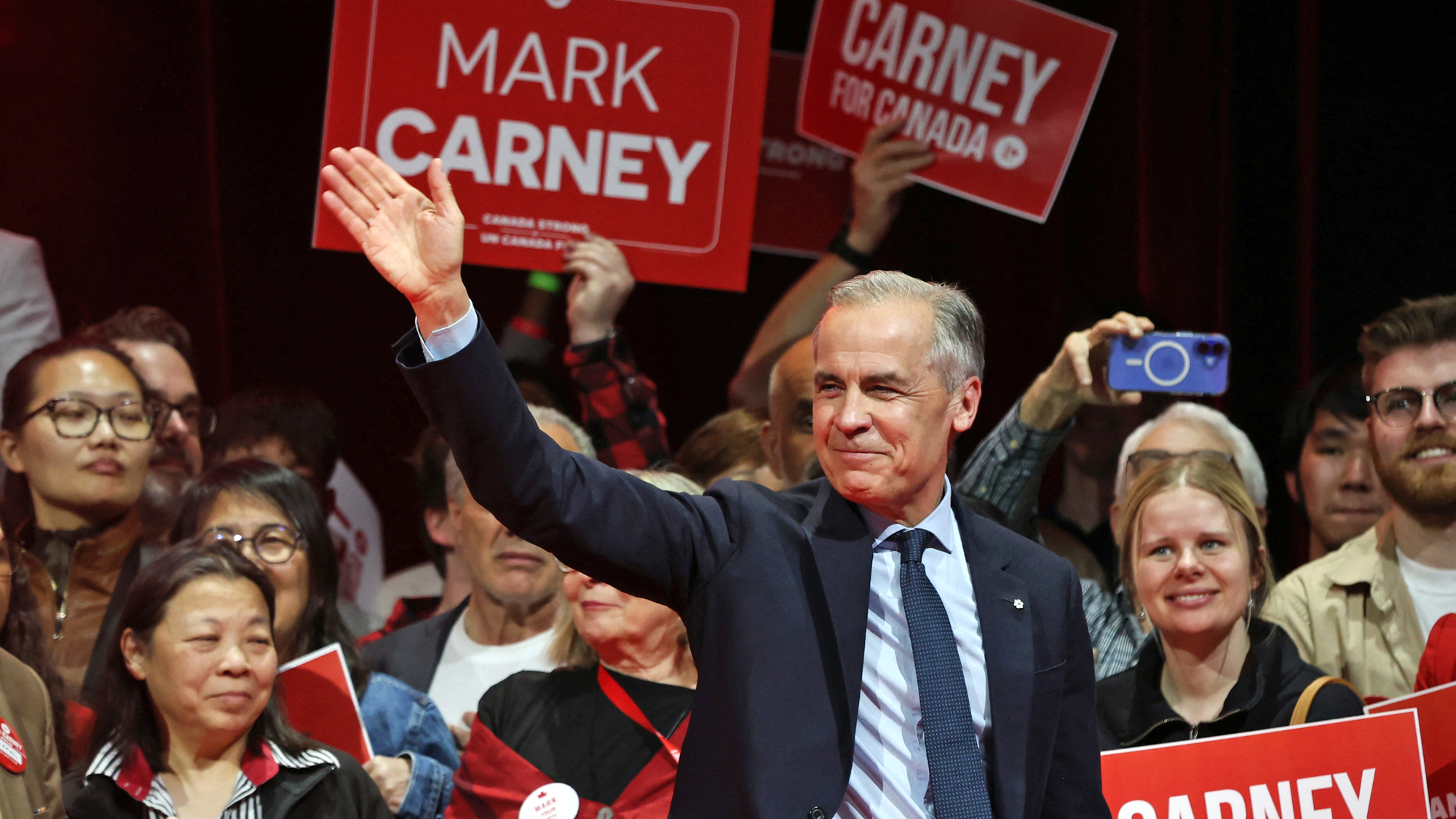Canada's Liberals, Carney win national election
The party of Prime Minister Mark Carney beat Conservative Pierre Poilievre thanks in part to Trump's trade war


A free daily email with the biggest news stories of the day – and the best features from TheWeek.com
You are now subscribed
Your newsletter sign-up was successful
What happened
Canada's Liberal Party won the most seats in Monday's national election, securing Prime Minister Mark Carney a full term in office, according to preliminary results Tuesday morning. The rare fourth consecutive election victory sealed a remarkable comeback for the Liberals, who trailed the Conservative Party, led by Pierre Poilievre, by more than 20 percentage points as recently as January.
Who said what
Carney, 60, became prime minister last month after Justin Trudeau stepped down amid sagging poll numbers. The combination of Trudeau's exit and President Donald Trump's "annexation threats and trade war" fueled the Liberals' "stunning turnaround in fortunes," The Associated Press said. "To say it's unprecedented is not only an understatement," Mount Royal University political scientist Lori Williams told The Washington Post, "it underplays the magnitude of the shift."
Trump "is trying to break us so that America can own us," Carney said in his victory speech. Canada's "old relationship with the United States" is "over," but "we are over the shock of the American betrayal" and "have many, many other options than the United States to build prosperity for all Canadians." A central banker new to politics, Carney easily won his first-ever seat in Parliament Monday.
The Week
Escape your echo chamber. Get the facts behind the news, plus analysis from multiple perspectives.

Sign up for The Week's Free Newsletters
From our morning news briefing to a weekly Good News Newsletter, get the best of The Week delivered directly to your inbox.
From our morning news briefing to a weekly Good News Newsletter, get the best of The Week delivered directly to your inbox.
Poilievre — who lost his own seat to a Liberal rival, the CBC/Radio-Canada projected Tuesday morning — conceded Monday night that the Conservatives "didn't quite get over the finish line yet" but focused on its gain of "well over 20 seats." In a "different election," the Conservatives would have been "successful" with their vote share, the BBC said, but the Liberals benefited as voters ditched smaller parties, "especially the left-wing New Democrats." Jagmeet Singh stepped down as NDP leader after losing his seat.
What next?
As of Tuesday morning, it wasn't clear whether the Liberals won a majority, or at least 172 seats — they were on track for at least 168, versus 144 for the Conservatives. "This is a dramatic comeback, but if the Liberals cannot win a majority," the "political uncertainty" could "complicate things for them," said McGill University political science professor Daniel Béland to the AP.
A free daily email with the biggest news stories of the day – and the best features from TheWeek.com
Peter has worked as a news and culture writer and editor at The Week since the site's launch in 2008. He covers politics, world affairs, religion and cultural currents. His journalism career began as a copy editor at a financial newswire and has included editorial positions at The New York Times Magazine, Facts on File, and Oregon State University.
-
 The Olympic timekeepers keeping the Games on track
The Olympic timekeepers keeping the Games on trackUnder the Radar Swiss watchmaking giant Omega has been at the finish line of every Olympic Games for nearly 100 years
-
 Will increasing tensions with Iran boil over into war?
Will increasing tensions with Iran boil over into war?Today’s Big Question President Donald Trump has recently been threatening the country
-
 Corruption: The spy sheikh and the president
Corruption: The spy sheikh and the presidentFeature Trump is at the center of another scandal
-
 Judge orders Washington slavery exhibit restored
Judge orders Washington slavery exhibit restoredSpeed Read The Trump administration took down displays about slavery at the President’s House Site in Philadelphia
-
 Hyatt chair joins growing list of Epstein files losers
Hyatt chair joins growing list of Epstein files losersSpeed Read Thomas Pritzker stepped down as executive chair of the Hyatt Hotels Corporation over his ties with Jeffrey Epstein and Ghislaine Maxwell
-
 Judge blocks Hegseth from punishing Kelly over video
Judge blocks Hegseth from punishing Kelly over videoSpeed Read Defense Secretary Pete Hegseth pushed for the senator to be demoted over a video in which he reminds military officials they should refuse illegal orders
-
 Trump’s EPA kills legal basis for federal climate policy
Trump’s EPA kills legal basis for federal climate policySpeed Read The government’s authority to regulate several planet-warming pollutants has been repealed
-
 House votes to end Trump’s Canada tariffs
House votes to end Trump’s Canada tariffsSpeed Read Six Republicans joined with Democrats to repeal the president’s tariffs
-
 Bondi, Democrats clash over Epstein in hearing
Bondi, Democrats clash over Epstein in hearingSpeed Read Attorney General Pam Bondi ignored survivors of convicted sex offender Jeffrey Epstein and demanded that Democrats apologize to Trump
-
 El Paso airspace closure tied to FAA-Pentagon standoff
El Paso airspace closure tied to FAA-Pentagon standoffSpeed Read The closure in the Texas border city stemmed from disagreements between the Federal Aviation Administration and Pentagon officials over drone-related tests
-
 Judge blocks Trump suit for Michigan voter rolls
Judge blocks Trump suit for Michigan voter rollsSpeed Read A Trump-appointed federal judge rejected the administration’s demand for voters’ personal data
